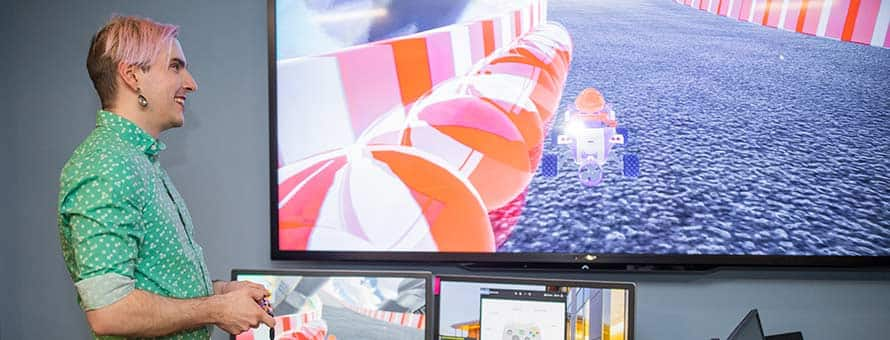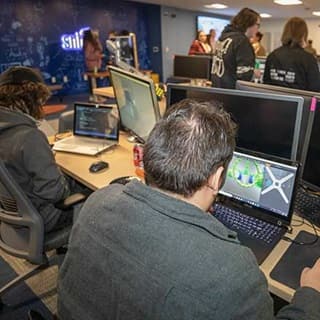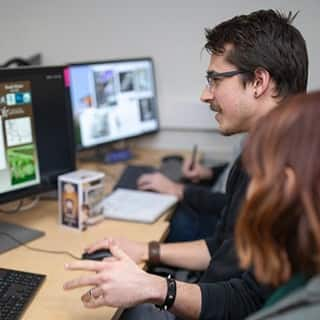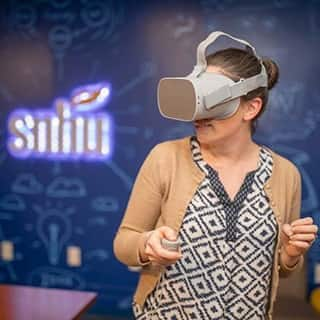SNHU Students Making Games and Magic at Inkwell Game Studio

Whether they’re designing a 3D character model or working with 360-degree camera images of a college campus, the work students in Southern New Hampshire University’s bachelor’s in game design are doing isn’t destined to be graded and filed away to gather digital dust. Instead, their work is incorporated in a cart-racing game for a local Make-a-Wish client, or a virtual reality campus tour for college admission representatives to use on the road.
 Game design and game programming students are working in SNHU’s new Inkwell Interactive Game Studio as part of integrated teams designed to mimic the environments they can expect to work in when they graduate. In addition to earning academic credits, students are also collaborating with internal and external clients to produce fully-developed projects. The experience, according to studio director Benjamin Red, has already generated excitement and commitment among students.
Game design and game programming students are working in SNHU’s new Inkwell Interactive Game Studio as part of integrated teams designed to mimic the environments they can expect to work in when they graduate. In addition to earning academic credits, students are also collaborating with internal and external clients to produce fully-developed projects. The experience, according to studio director Benjamin Red, has already generated excitement and commitment among students.
“Our goal is to replicate as much of the real industry working experience as possible to prepare our students and give them a taste of their future career …,” he said. “I think one of the things that’s great about having this studio environment is that students know this is something that is going out into the world. I think it’s more exciting and I think it helps those students feel that sense of connection and sense of purpose in what they’re doing.”
Designing a New Space
A key piece to the program’s philosophy is the new studio that opened in October. The space features high-performance PCs for 16 students, offices and conference space. There are two large flat-screen monitors mounted to the walls for group presentations and game reviews, as well as space for VR development.
 At an open house on Jan. 29, SNHU Campus President Patty Lynott said the studio reflected the kinds of resources the university should be offering students.
At an open house on Jan. 29, SNHU Campus President Patty Lynott said the studio reflected the kinds of resources the university should be offering students.
"It represents everything we want to do in terms of teaching and innovation," she said. "We're proud of this team and these students."
“The space was really built as best as possible to represent and replicate what the studios these students will eventually be working in one day,” Red said. “The way the students respond to the space and the way they operate when they’re in here, you can see that they’re really getting into it. They’re taking on the roles of developers.”
Ed Brillant, SNHU's game art and development coordinator, said a wide range of stakeholders, from instructors, deans and consultants from SNHU's Sandbox Collaborative worked to build a model that integrated the academic program with a working game design studio.
"That's really where a lot of the magic happened," he said.
Projects with Impact
One client students have already partnered with is SNHU’s International Programs office. Using a 360-degree camera, students built a VR campus tour that is displayed on an Oculus Go, a standalone VR headset. Potential students visiting SNHU booths at college fairs can experience the campus from anywhere in the world. Students are also working with Boston Children’s Hospital on a VR simulation for the hospital’s nurse training program.
 On another project, Make-a-Wish client Parker Bolton is acting as art director. Students have taken his drawings and designs to build a cart-racing game. He recently visited the studio to try the first playable demo of the game. “It was an hour and a half of shrieking laughter,” Red said.
On another project, Make-a-Wish client Parker Bolton is acting as art director. Students have taken his drawings and designs to build a cart-racing game. He recently visited the studio to try the first playable demo of the game. “It was an hour and a half of shrieking laughter,” Red said.
Red is looking forward to two upcoming projects the studio will be taking on soon. On one, game design students will work with their classmates in SNHU's ecology department to design an augmented reality model of the university's arboretum. "Think 'Pokemon Go, but informative and environmentally-conscious," he said.
On a second project students will partner with students in SNHU's psychology department and doctors at a Boston-area hospital to design an MRI simulator. Red said the hospital has found that MRIs are difficult for many veterans with post-traumatic stress disorder because of the noise and confined space.
"We'll be creating a virtual reality experience as a sort of desensitization therapy to help individuals successfully receive important medical treatments," he said.
Brian Conant, a senior game programming major, said working on projects with partners like Make-A-Wish and Boston Children's Hospital enhanced his college experience.
"It's cool because it's a project that actually matters. We have a client we're working with and doing a project to their specifications that's going to make a difference in their lives, make a difference for a lot of people," he said. "It's crazy. I never thought I'd have this kind of experience during college."
Making More Than Only Video Games
Red said the arrangement is mutually beneficial because the students create technology solutions their clients need, and students develop stronger examples of their work they can show to potential employers. Instead of a programming demo that doesn’t look very good or an attractive 3D asset that isn’t interactive, students are combining their skills and work to create a cohesive product.
 “It’s not going to be an ingredient in isolation. It’s going to be part of a bigger project that they can put on their resume,” Red said. “It will really showcase not only their technical skills and their prowess in fabricating these assets but that collaborative element in terms of bringing those pieces together into a functioning project.”
“It’s not going to be an ingredient in isolation. It’s going to be part of a bigger project that they can put on their resume,” Red said. “It will really showcase not only their technical skills and their prowess in fabricating these assets but that collaborative element in terms of bringing those pieces together into a functioning project.”
Brillant said the work with clients such as Boston Children's Hospital also show students other ways the skills they're developing can apply to work outside the gaming industry.
"They're learning skill sets. They're not just learning games," he said. "It's showing students that it's more than just video games. It's giving them a broader view of what their sills can do."
The model also helps students develop the all-important soft skills they will need to function in the game design industry, including working as part of a multi-disciplinary team, working with external clients and more.
“People without that skill set are going to have a much harder time in the industry, so this is a really great opportunity for our students to demonstrate they have not just the skills but the full package,” Red said.
Joe Cote is a staff writer at Southern New Hampshire University. Follow him on Twitter @JoeCo2323.
Explore more content like this article

How to Get Into AI: What AI at Work Looks Like for Beginners

Understanding AI Ethics: Issues, Principles and Practices

What is the Best Degree for an Artificial Intelligence Career?
About Southern New Hampshire University

SNHU is a nonprofit, accredited university with a mission to make high-quality education more accessible and affordable for everyone.
Founded in 1932, and online since 1995, we’ve helped countless students reach their goals with flexible, career-focused programs. Our 300-acre campus in Manchester, NH is home to over 3,000 students, and we serve over 135,000 students online. Visit our about SNHU page to learn more about our mission, accreditations, leadership team, national recognitions and awards.


